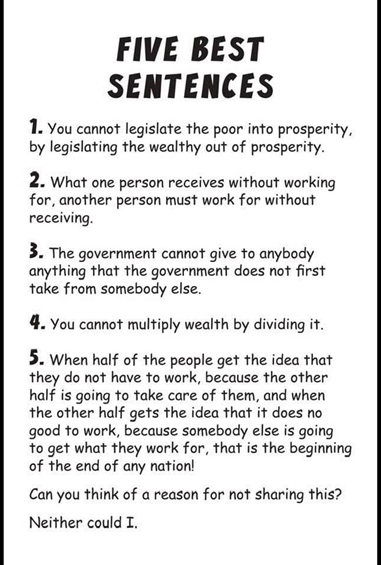Social Media: Promulgating Memes and Slovenly Thinking

To paraphrase Lesley Gore: It's my soapbox and I'll preach if I want to…
Know that I really don’t want to devolve into the kind of person who trolls Facebook for the sole purpose of becoming enraged. Still, there are days when I can’t seem not to see generalized stupidity out there.
Most recently I came across this gem. It was reposted by an acquaintance of mine (not technically a “friend”). In conversation, he is an agreeable and polite fellow. An American from the South, he has some secondary education and likely has not completed any post-secondary schooling. I believe he has done some work-related courses in various disciplines and seems reasonably intelligent. He is a devout and practicing Christian of (I think) the Baptist variety.

The post itself appears relatively innocuous, but it is this wide-eyed feigned innocence and “common-sense” approach that renders it a fiendishly insidious “othering” machine. There is no author cited and no references, as is often the case in such memes.
Let’s take this step by step.
1. You cannot legislate the poor into prosperity by legislating the wealthy out of prosperity.
As an opening line it sets the tone for the rest of the “five best sentences”. It clearly divides the population into two distinct groups; the rich and the poor.
According to the dictionary, “prosperity” is “the condition of being successful or thriving” and it is now typically associated with economic well-being. The word itself is quite old, but until recently, it merely signified a “favourable state, outcome, or success” without necessarily focusing solely on money.
When Mr. Spock in Star Trek wished others to “live long and prosper”, he was referring to longevity and successful well-being, not to hoarding a pile of money.
Let us return to our two groups: The poor and the wealthy. The position of the author of these five sentences is that government cannot help the poor to become rich by taking away money owned by the wealthy. It also suggests that this is the only — and misguided — way to remedy the plight of the poor.
Clearly this is not the case, and there are all sorts of methods to achieve better equity, but facile and mindless little posts like these are so much simpler. They are great “othering” machines and mechanisms to assign fault and blame. If you are on the wrong side of the divide (they imply), if you are poor (they suggest), it’s your own fault.
The economy is not merely a zero-sum game. Clearly defined by Wikipedia, a zero-sum game is a “situation that involves two competing entities, where the result is an advantage for one side and an equivalent loss for the other. In other words, player one's gain is equivalent to player two's loss, with the result that the net improvement in benefit of the game is zero.”
More simply put, the economy is not a poker game.
2. What one person receives without working for, another person must work for without receiving.
Again, we see a black and white dichotomy. Takers and givers. And yet each one of us has received something we have not worked for in some context or another. That is a hallmark of a kind and decent society, a caring family, a loving relationship. Sounds a little like “prosperity” to me.
3. The government cannot give anybody anything that the government does not take first from someone else.
According to the decidedly conservative website USHistory.org, government is here to “provide the parameters for everyday behavior for citizens, protect them from outside interference, and often provide for their well-being and happiness.”
It only stands to reason that in order to provide all its citizens with well-being and happiness, a governing body will need to have funds. Until we find a more creative solution, the government will gather those funds, in the form of taxes, to provide for the greater good.
In a world where no one would receive anything from a government to which they had not contributed, would the author of this meme complain when firefighters did not come to quench the flames of his burning house? Or when the roads to get to his home were impassable?
Statement no. 3 is not altogether incorrect, but it implies the government is somehow irrevocably unjust.
4. You cannot multiply wealth by dividing it.
This is just plain silly — a naïve, overly simplistic and misleading conservative bromide. Even using the highly capitalistic example of the stock market, when you divide money among those who create or invest in innovative products and services — as opposed to hoarding riches — the economy grows faster. Competition among many players in the economy contributes to innovation and overall growth, whereas the concentration of riches leads to monopolies, oligarchy, and economic stagnation.
More broadly, societal wealth, defined as the collective well-being of its constituents — its prosperity measured especially in other-than-financial terms, such as health, security and happiness — is certainly better overall (i.e., multiplied by some factor), when its riches are divided and distributed among many.
5. When half the people get the idea they do not have to work because the other half is going to take care of them, and the other half gets the idea that it does no good to work because somebody else is going to get what they work for, that is the beginning of the end of any nation.
Wow.
First off, again we see a black and white division, a light on/light off scenario, then rather hysterically capped with a dire prediction of end-times. A case of “us” and “them”, with everyone falling neatly into a box. It smacks of the remnants of Calvinism, with a touch of Ayn Rand, and a dash of Social Darwinism (adopting Tennyson’s “red in tooth and claw” with a twist of the misconstrued “survival of the fittest”).
Aside from situations where people find themselves doing unpleasant jobs out of necessity, most people seem to enjoy working. They derive pleasure from their work in and of itself, and gain value from contributing.
Does this Facebook post even matter? Yes, I believe it does.
It matters because we are collectively losing our ability to conduct a rational analysis of a given situation. We descend into trivial and trite sound-bytes of information, strung together by (perhaps unconscious yet effective) alliteration.
The thinking and presentation behind the “five best sentences” meme is slovenly at best. At worst, it encourages the intellectually undiscerning to obligingly wield the pre-sharpened tools of the corporate capitalist establishment.
And on that final note, I will step off my soap-box (for now).
Would you like to read other posts? If so, please click the Home Page link below:

You, Dear Reader, are much needed and appreciated.
Everything written requires a reader to make it whole. The writer begins, then you, dear reader, take in the idea and its image, and so become the continuation of its breath. Please subscribe so that my words can breathe. Consider this my hand, reaching out to yours.
